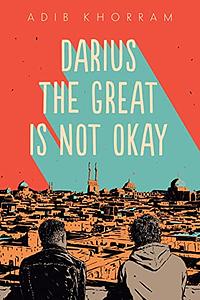You need to sign in or sign up before continuing.
Take a photo of a barcode or cover
emotional
hopeful
inspiring
reflective
i loved this. this was a really soft coming of age novel, mostly just a boy growing up and coming to terms with himself in general - his heritage, his body, his identity, his mental health, his relationship with his father. the book talked a lot about how darius felt too persian, or too alien at school in america, but not persian enough in iran because he couldn’t speak farsi very well and didn’t know about a lot of persian traditions. a strange limbo. the relationship between him and his first real friend sohrab was really sweet and well-written. this was also a really true depiction of depression, especially in teenagers. and the difference between how americans and iranians view mental health was interesting as well. mostly i really liked the voice of this novel; adib khorram seems to curate it really well. he nails the 16 year old cynical depressed loser /pos narrative voice.
cannot put to words how much i loved this book
emotional
medium-paced
Darius, struggling with depression and a tough family situation, travels to Iran to meet his mom's family for the first time. There, he begins to feel connected with life in Iran, his grandparents, and especially Sohrab, the boy next door who becomes his best friend. Sohrab helps Darius feel like a "True Persian" and embrace his Persian identity, making the trip a life-changing experience that he'll have to carry back to America.
What a beautiful exploration of culture, heritage, mental health, family, and self discovery. There was so much packed into this short YA book, but it was handled beautifully. Adib Khorram did an exceptional job at writing an MC with depression and how that impacted so many parts of his life and his relationships with others, as well as how western and eastern cultures view mental health. Darius is shy and awkward and often feels like he’s not good enough, especially around his father, which makes him easy to relate to. This book highlighted Persian culture and reminded me how much I love to read stories from different parts of the world. I also loved that the author didn’t explain everything, leaving space for imagination when it comes to Darius' sexuality. There is a beautiful closeness between Darius and Sohrab that could be seen as romantic intimacy but could also just be a deep platonic connection. I cannot wait to read the sequel.
What a beautiful exploration of culture, heritage, mental health, family, and self discovery. There was so much packed into this short YA book, but it was handled beautifully. Adib Khorram did an exceptional job at writing an MC with depression and how that impacted so many parts of his life and his relationships with others, as well as how western and eastern cultures view mental health. Darius is shy and awkward and often feels like he’s not good enough, especially around his father, which makes him easy to relate to. This book highlighted Persian culture and reminded me how much I love to read stories from different parts of the world. I also loved that the author didn’t explain everything, leaving space for imagination when it comes to Darius' sexuality. There is a beautiful closeness between Darius and Sohrab that could be seen as romantic intimacy but could also just be a deep platonic connection. I cannot wait to read the sequel.
Before starting it I really hoped that as someone who lives in Iran, the story would be convincing, and fortunately it was. Though I'd loved it more if it showed more things in about Iran but I was satisfied with it. The story was about friendship and family, and dealing with depression. And it was portrayed great. Characters and their stories and their relationships, came to a good end with this emotional final.
P.S: I really liked to have Sohrab as my friend too.
P.S: I really liked to have Sohrab as my friend too.
“How could I be a tourist in my own past?”
اگه بخوام دقیق بشم، میشه ایرادهای زیادی از این کتاب گرفت؛ توی شخصیتپردازی، توی نحوه روایت داستان، همهی فضاها و ایدههایی که جای کار بیشتر داشتن. اما حقیقت اینه که اینقد این کتاب و مسائل مطرحشده توش رو دوست داشتم که نمیرم سمت اشکالهاش. بهرحال هدفم هم از خوندنش فقط این بود که حالم بهتر بشه و شد. فعلاً بنظرم همین کافیه.
بنابراین من شبیه همون بچهی احساساتیای که همیشه هستم، کلی با این کتاب خندیدم و گریه کردم و گذاشتم اون تأثیری رو که لازمه روم بذاره. گذاشتم داستانْ من رو با خودش ببره جلو و از اینکه اینقد دقیق همهچی رو راجعبه ما میدونست سورپرایزم کنه.
هرچند، قبول دارم کتابی نیست که پایانش زیاد اهمیتی داشته باشه. از اون سفرهاییه که جادهش از مقصدش قشنگتره. حتی با اینکه ما خودمون توی جاده زندگی میکنیم، و حتی با اینکه میدونیم ممکنه اصلاً مقصدی وجود نداشته باشه.
نمیتونم با اطمینان بگم اگه ایرانی نبودم بازم همینقدر ازش خوشم میاومد یا نه، اما این رو میدونم که چیزایی که راجعبه این کتاب من رو تحت تأثیر قرار دادن، ربطی به ایرانی بودن شخصیتها و فرهنگشون نداشتن. مثل افسردگی، که بطرز ترسناکی واقعی نشون داده شده بود، یا باورپذیر بودن رابطهی داریوش با شخصیتها و اون حجم از صداقتی که دربارهی احساساتش با خودش داشت.
در پایان اینکه میشه گفت این کتاب تا حدودی مهمترین ویژگی برای راضی کردنم رو داشت: شناختن داستان مثل یه خواننده، و نه مثل نویسندهی اثر. تقریباً مطمئنم که یه جای دیگه هم به این نکته اشاره کردم ولی دوباره هم میگم، چون لااقل برای من خیلی خیلی مهمه. دارم میبینم که این روزا توی خیلی از کتابها بهش توجه نمیشه، و من میمونم با یه عالمه جای خالی توی ذهنم که خودم باید حین خوندن پُرشون کنم. بنابراین خوشحالم که از این جهت ناامیدم نکرد.
اما اگه بخوام دوباره برگردم به همون بحث کتابها-با-من-حرف-میزنن(که من رو یک روانی تمامعیار نشون میده)، میتونم این رو هم اضافه کنم که این کتاب، برخلاف خود داریوشْ افسرده نبود. بیشتر شبیه کسی بود که میخواست بخشیده بشه و این حجم از پشیمونی غیرعادیش بود که باعث میشد داستان رو ادامه بدم. اما در نهایت با همهی عیب و ایرادهاش بخشیدمش. امیدوارم شما هم همین کار رو بکنید.
پ.ن: نمیدونم چرا همیشه خوندن اینجور کتابهای ایرانی-آمریکایی بوده که حالمو خوب کرده. شاید بخاطر اینکه روی همون مرزی ایستادن که من اغلب مواقع میایستم. مرز ایرانی بودن و نبودن. تعلق داشتن و نداشتن.
اگه بخوام دقیق بشم، میشه ایرادهای زیادی از این کتاب گرفت؛ توی شخصیتپردازی، توی نحوه روایت داستان، همهی فضاها و ایدههایی که جای کار بیشتر داشتن. اما حقیقت اینه که اینقد این کتاب و مسائل مطرحشده توش رو دوست داشتم که نمیرم سمت اشکالهاش. بهرحال هدفم هم از خوندنش فقط این بود که حالم بهتر بشه و شد. فعلاً بنظرم همین کافیه.
بنابراین من شبیه همون بچهی احساساتیای که همیشه هستم، کلی با این کتاب خندیدم و گریه کردم و گذاشتم اون تأثیری رو که لازمه روم بذاره. گذاشتم داستانْ من رو با خودش ببره جلو و از اینکه اینقد دقیق همهچی رو راجعبه ما میدونست سورپرایزم کنه.
هرچند، قبول دارم کتابی نیست که پایانش زیاد اهمیتی داشته باشه. از اون سفرهاییه که جادهش از مقصدش قشنگتره. حتی با اینکه ما خودمون توی جاده زندگی میکنیم، و حتی با اینکه میدونیم ممکنه اصلاً مقصدی وجود نداشته باشه.
نمیتونم با اطمینان بگم اگه ایرانی نبودم بازم همینقدر ازش خوشم میاومد یا نه، اما این رو میدونم که چیزایی که راجعبه این کتاب من رو تحت تأثیر قرار دادن، ربطی به ایرانی بودن شخصیتها و فرهنگشون نداشتن. مثل افسردگی، که بطرز ترسناکی واقعی نشون داده شده بود، یا باورپذیر بودن رابطهی داریوش با شخصیتها و اون حجم از صداقتی که دربارهی احساساتش با خودش داشت.
در پایان اینکه میشه گفت این کتاب تا حدودی مهمترین ویژگی برای راضی کردنم رو داشت: شناختن داستان مثل یه خواننده، و نه مثل نویسندهی اثر. تقریباً مطمئنم که یه جای دیگه هم به این نکته اشاره کردم ولی دوباره هم میگم، چون لااقل برای من خیلی خیلی مهمه. دارم میبینم که این روزا توی خیلی از کتابها بهش توجه نمیشه، و من میمونم با یه عالمه جای خالی توی ذهنم که خودم باید حین خوندن پُرشون کنم. بنابراین خوشحالم که از این جهت ناامیدم نکرد.
اما اگه بخوام دوباره برگردم به همون بحث کتابها-با-من-حرف-میزنن(که من رو یک روانی تمامعیار نشون میده)، میتونم این رو هم اضافه کنم که این کتاب، برخلاف خود داریوشْ افسرده نبود. بیشتر شبیه کسی بود که میخواست بخشیده بشه و این حجم از پشیمونی غیرعادیش بود که باعث میشد داستان رو ادامه بدم. اما در نهایت با همهی عیب و ایرادهاش بخشیدمش. امیدوارم شما هم همین کار رو بکنید.
پ.ن: نمیدونم چرا همیشه خوندن اینجور کتابهای ایرانی-آمریکایی بوده که حالمو خوب کرده. شاید بخاطر اینکه روی همون مرزی ایستادن که من اغلب مواقع میایستم. مرز ایرانی بودن و نبودن. تعلق داشتن و نداشتن.
challenging
dark
emotional
medium-paced
challenging
emotional
sad
medium-paced
emotional
funny
hopeful
reflective
sad
medium-paced
Plot or Character Driven:
Character
Strong character development:
Yes
Loveable characters:
Yes
Diverse cast of characters:
Yes
Flaws of characters a main focus:
Yes






